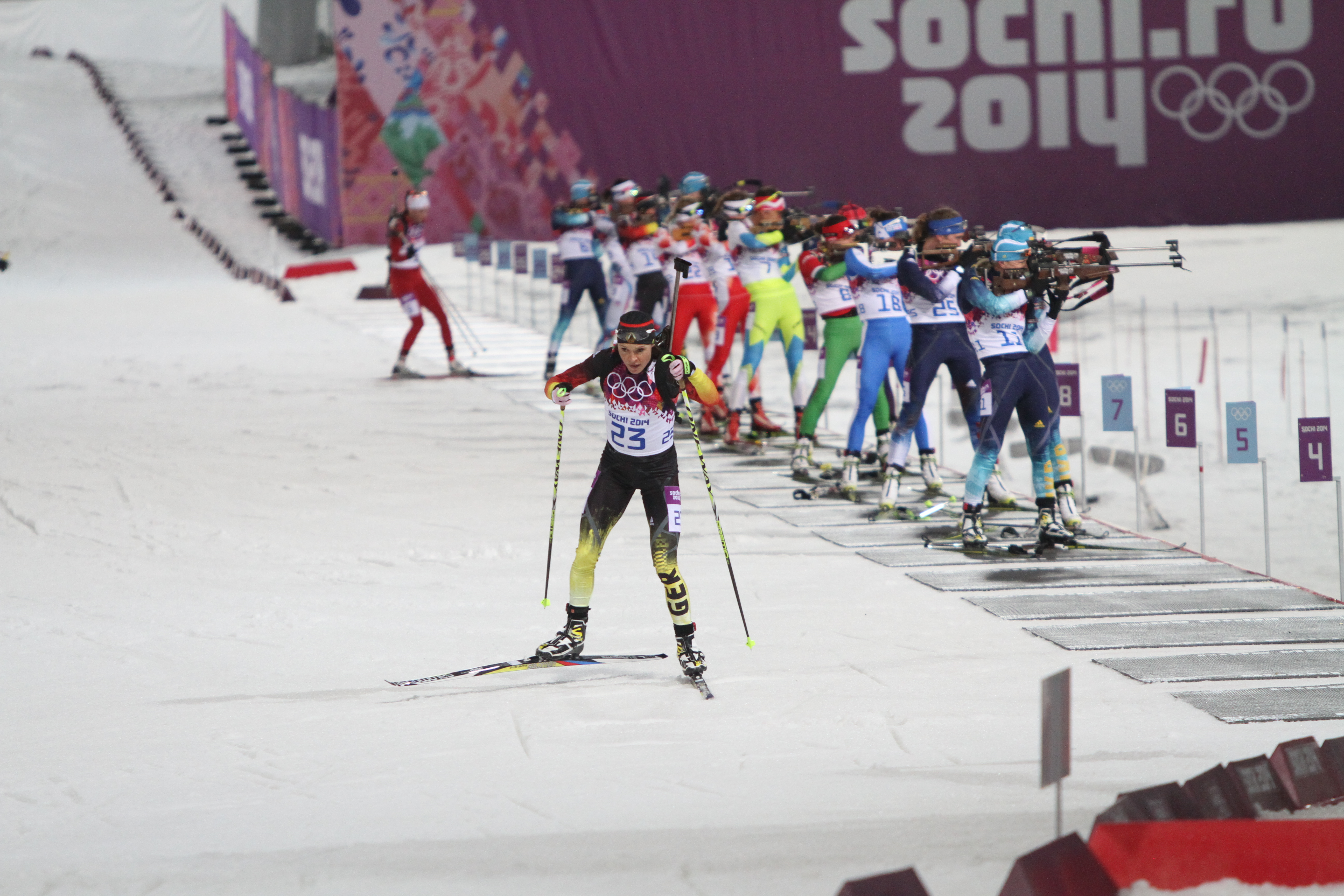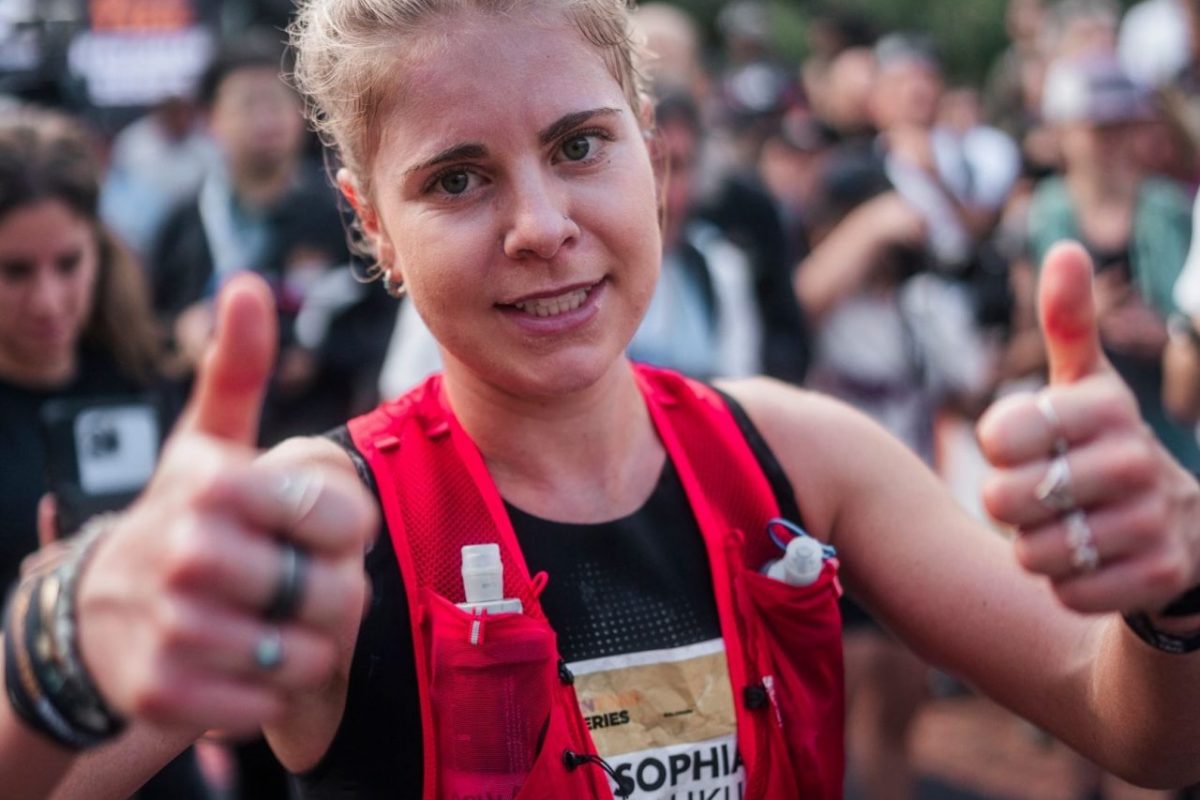
German skier-turned biathlete Evi Sachenbacher-Stehle has been banned from competition for two years after testing positive for methylhexanamine, a banned stimulant, at the Olympic Games in Sochi in February.
Sachenbacher-Stehle is an Olympic gold medalist in the team sprint from the 2010 Vancouver Olympics. She subsequently switched to biathlon and had a very successful two years; she had placed fourth in the mass start in Sochi, but the result was nullified after her positive test.
Sachenbacher-Stehle had, from the beginning of the case, asserted that the stimulant entered her body through a contaminated dietary supplement; she takes nine supplements, she said, and had tested three which were manufactured in countries with a history of drug contamination to make sure that they did not contain anything on the World Anti-Doping Agency’s (WADA) Prohibited List.
Teepower Schisandra, a concentrated tea powder which Sachebacher-Stehle took for immune system support and “general health”, was not one of them – and turned out to contain the banned supplement. It’s unclear whether it is an intentional ingredient in the tea, or appeared via contamination.
Sachenbacher-Stehle argued that since she had ingested the stimulant accidentally, with no intention to use it to enhance her performance, her ban should be reduced.
But the Anti-Doping Hearing Panel organized by the International Biathlon Union (IBU) rejected this idea, despite the fact that there is a written guideline for how to reduces sentences. The three-member panel seemed to reject the entire notion that this was appropriate.
“It Was an Accident!”
Many dopers claim that they had no idea a banned substance was on the ingredient list of a medicine or supplement – and usually, they aren’t taken seriously. After all, the blood-doping drug recombinant erythropoietin probably doesn’t show up in cosmetic skin-smoothing injections.
But other times, it’s pretty clear that athletes didn’t do their homework and did end up taking a prohibited substance without meaning to, most commonly through dietary supplements. That makes them negligent, but not intentional cheaters. There are literally hundreds of cases – 758 between 2008 and 2013 – of athletes around the world testing positive for methylhexaneamine alone, due to dietary supplements. This represented 7 % of all positive tests in 2012. Only testosterone and marijuana are more frequently detected.
Yet accidental ingestion has claimed careless athletes around the sporting world: Jamaican sprinters, South African rugby players, and Major League Baseball prospects. One reason for the confusion is that the substance goes by many different names, including the seemingly innocuous “geranium oil”.
For instance, this is what Sachenbacher-Stehle says happened to her: she knew that she could get into trouble with the nine supplements that she uses, so she took some precautions. She had read the Teepower Schisandra labels and the substance was not listed. Because it was not manufactured in a country where supplement mislabeling and contamination is common, she did not have it tested, though she did test three of her other supplements.
The vast number of mostly accidental positive tests has contributed to debate about whether the drug should even be banned. In the case of methylhexaneamine, the issue is complicated by the fact that there has never been a well-designed study to assess whether the stimulant is actually performance-enhancing when used by athletes. One doctor estimated that its effects might be only slightly stronger than a cup of coffee.
“If she was trying to enhance her performance, there are much better ways to do it,” IBU Vice President for Medical Issues Jim Carrabre told FasterSkier regarding Sachenbacher-Stehle.
Rules for Reduced Sentencing
Appearing in person at the arbitration hearing, Sachenbacher-Stehle sought to argue that her sentence should be reduced because she did not knowingly take the stimulant and was not seeking to enhance her performance.
Through the InternatioIBU rules (which are based on WADA code), a ban can be reduced or negated if an athlete demonstrates two conditions: first “establish how a Specified Substance entered his or her body” and second “that the athlete did not intend the Specified Substance found in the athlete’s system to enhance the athlete’s sport performance.”
The strategy has worked in stimulant/supplement cases in the past in other sports. Notably Jamaican sprinters Asafa Powell and Sherone Simpson had their bans reduced to six months by the Court of Arbitration for Sport after the court was satisfied that they unwittingly ingested oxilofrine, a stimulant in the same class as methylhexaneamine, in their dietary supplements.
It had seemed like a possibility for Sachenbacher-Stehle. Many in the biathlon community seemed convinced that she took the stimulant by accident.
The hearing panel did, too. They recognized that methylhxaneamine came through the Teepower supplement (which she had tested after her positive test, and to her dismay discovered that it had caused the violation), and that she didn’t mean to take it.
But they struggled with the second part of the requirement, about the Specified Substance not being meant to enhance performance (their debate can be found in the minutes). Choosing to take “Specified Substance” to be the supplement, not the stimulant per se, they wrote that of course it was intended to be performance-enhancing. So would eating a steak or an apple – everything an elite athlete does is meant to help performance, they explained:
“almost everything a serious athlete does in his or her life is to enhance his or her sport performance, be it to get enough sleep; eat balanced and nutritious foods; maintain an appropriate weight level for the competition at hand; get enough rest to permit proper recovery from workouts; take permitted medication [sic] when sick; take consideration of the appropriate altitude to train at for a particular competition; and so forth. Following healthy practices to ‘enhance’ one’s sport performance is not bad/cheating.”
Instead, they focused on another section of the anti-doping code, which states that athletes are strictly responsible for anything that enters their bodies. The hearing panel was clearly thinking about setting precedents and the long-term implications of its decision. In a subtle dig at Sachenbacher-Stehle, they noted that “experienced athletes training at the international levels” should be held to strict standards.
Sachenbacher-Stehle, for example, argued that she had read the ingredient list and that nothing prohibited was on it. She had also consulted her nutritional expert, who repeatedly told her that the supplement was safe. She heard that other athletes had taken the supplement and not failed a doping test. She had even googled the product name with “doping”, and found nothing.
That wasn’t strict enough. The panel countered: “Any elite biathlete who took the product after reading the [product’s website, which claims to boost endurance] would be taking the product fully aware that the product was purported to enhance performance.”
In other words, even supplements or other natural substances which may help performance without using prohibited substances should be avoided on principle. The message seemed to be that the IBU was taking a stronger stance than other regulators.
Accordingly, they banned the German Olympic champion for two years.
What About Contamination?
While the decision ends the waiting over this case, it leaves many issues regarding nutritional supplements less than crystal clear. Athletes routinely take supplements; what is their burden in order to ensure that nothing prohibited is in these supplements?
An issue which the panel did not even touch upon was the contamination of supplements from factories which make multiple products.
An IOC study in 2002 found that 14-19% of herbal supplements contained steroids or hormones which were not declared on the label as a result of contamination. A separate study in the UK found similar numbers when it included stimulants in the analysis.
For instance, the panel wrote that Sachenbacher-Stehle should have asked a medical doctor whether the supplement was safe. But it’s doubtful that any medical doctor is familiar with each and every nutritional supplement or whether it has previously faced issues of contamination. They might simply take the same investigatory steps that Sachenbacher-Stehle herself took.
Her nutritionist, Stefan Saxinger, for example, has 15 years of experience working with elite athletes including tennis pros and champions in windsurfing and sailing. He probably knew as much about dietary supplements as many medical doctors; the end result was still a positive test.
The panel produced no instruction on the issue of contaminated supplements, only the repeated and assertive comment that because the supplement claimed to boost endurance, Sachenbacher-Stehle should have known it was illegal. They also wrote that because it was recommended to take small doses, this was another clue that it was probably prohibited.
Yet many supposedly natural products offer claims to boost everything from energy levels to memory – it’s probably more likely that a product simply doesn’t work, than that it works because it contains a prohibited substance.
Confusion Over the Sentence
Ross Tucker, a well-known South African sports scientist, wrote in 2010 that methylhexaniamine positives were the fault of an “unregulated” supplement industry, which is where the lion’s share of the blame should be placed – for being dangerous, and for ruining athletes’ careers.
That’s partly why the WADA exception was made: if an athlete really did make a good-faith effort to ensure that they were playing by the rules with their supplements, the World Anti-Doping Agency (WADA) decided, they should be punished less harshly for failing in the end.
The IBU panel did not consider Sachenbacher-Stehle’s effort to be good enough – or perhaps they wanted to set a precedent that they did not agree with WADA’s previous stance on this issue.
Sachenbacher-Stehle was particularly offended because the verdict for the Irina Starykh case came out on the same day, where the same three-man panel handed down an identical ban. Starykh, a Russian biathlete, had taken recombinant erythropoetin, a much more potent drug which irrefutably boosts the oxygen-carrying capacity of the blood and thus improves performance.
“For me it is completely incomprehensible that my case of unknowingly ingesting something is treated at the same level as a cheater knowingly taking EPO,” she said.
She believes that the case is being used to set an agenda.
“It forces suspicion on the basis of my case that food supplements are looked down upon,” she said in a written statement, according to a translation. “He called for the maximum sentence, saying, inter alia, that a reduction of the sentence would send a wrong signal to the Biathlon World. It has in my opinion nothing to do with factual considerations, but is exclusively politically motivated.”
The German ski federation, DSV, was also disappointed in the decision.
“We were surprised that the ban was for two years because this is usually reserved in cases of deliberate doping,” DSV president Franz Steinle said according to the German newspaper Der Spiegel.
Steinle said that, nonetheless, DSV considers Sachenbacher-Stehle to have been “negligent”.
Michael Vesper of the German Olympic Sports Confederation also expressed his shock.
“It is a harsh assessment for the use of stimulants which are prohibited in competition, but not even in training,” he told Die Welt. “Obviously, the world governing body has found no extenuating circumstances, which frankly surprises me based on other cases.”
Mark Heinkelein, Sachenbacher-Stehle’s lawyer, told Die Welt that the team was analyzing the decision and deciding whether or not to appeal to the Court of Arbitration for Sport.
Pundits note that at age 33, Sachenbacher-Stehle’s career is likely over if she serves a two-year ban.
Chelsea Little
Chelsea Little is FasterSkier's Editor-At-Large. A former racer at Ford Sayre, Dartmouth College and the Craftsbury Green Racing Project, she is a PhD candidate in aquatic ecology in the @Altermatt_lab at Eawag, the Swiss Federal Institute of Aquatic Science and Technology in Zurich, Switzerland. You can follow her on twitter @ChelskiLittle.



